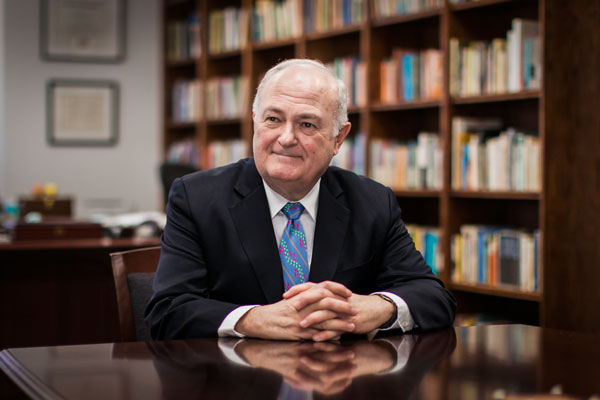Officials are conducting a University-wide review to evaluate current goals and set new ones.
Outside consultants will review University President Steven Knapp’s impact on the University during his tenure and officials’ progress on the strategic plan, and will determine what administrators need to prioritize coming years. Faculty and experts say this kind of review is common at universities when a president’s contract is near expiration, especially to help the Board of Trustees evaluate whether or not to renew the contract.
The review focuses on three areas: a “holistic evaluation” of Knapp’s tenure, general plans for the future of GW and “implementation and impact” of the University’s decade-long strategic plan, according to a University release.
“Periodic review of university leadership and direction is the norm in higher education today,” Knapp said in the release.
University spokeswoman Candace Smith declined to comment on who is involved in the review, what officials anticipate the results of the review to be, exactly how the results will guide officials’ plans and when the assessment is expected to end.
Nelson Carbonell, chair of the Board of Trustees, said in a release that progress evaluation is important for goal-setting moving forward.
“I have found periodic assessments, whether in the corporate world or higher education, serve a valuable purpose and can help focus an organization on its strategic priorities,” Carbonell said. “We look forward to receiving the feedback from the GW community.”
The past 10 years
Experts and faculty said reviewing a president’s progress is normal, especially when they are nearing the end their contracts. Knapp’s contract is set to expire in 2017.
Since Knapp began his tenure as University president in 2007, he has focused on improving GW’s status as a research university, adding administrative positions and overseeing major projects like the Science and Engineering Hall.
He oversaw the creation and implementation of the 10-year strategic plan, and has also prioritized accessibility and sustainability strategies.
In December, Knapp called for each division of the central administration to cut their budgets by 3 to 5 percent each year for the next five fiscal years, placing more financial responsibility on GW’s 10 schools. Budget cuts also hit GW’s schools after an unexpected drop in graduate enrollment.
Charles Garris, chair of the Faculty Senate’s executive committee, said the review is ordinary procedure for when a president’s contract expires, as most university presidents only last 10 or 15 years at one institution. Knapp is on his second five-year contract.
“The Board is following a process that is totally normal,” Garris said. “They want to look at what the president has accomplished, what our trajectory is, and where we’re going in the future.”
Garris, who has been a professor of aerospace engineering at GW for more than 40 years, said he thinks the Board of Trustees will renew Knapp’s contract. He said before former University President Stephen Joel Trachtenberg stepped down, the Board recommended finding a new president who would make GW more research-oriented.
“The Board felt Trachtenberg had built up undergraduate programs beautifully, but a research institution was not Trachtenberg,” Garris said. “When Knapp came from Johns Hopkins, the Board felt he would provide good leadership moving forward as a research institution.”
Evaluating the strategic plan
Knapp and the Board of Trustees begin the review process as the University approaches 2021 – the end of its current strategic plan, “in light of current and anticipated challenges and opportunities,” according to the release.
Former Provost Steven Lerman, who stepped down from his position at the end of last semester, created the strategic plan in 2012 to overhaul all areas of the University, adding a focus on interdisciplinary research and global growth. When Lerman announced his departure from the provost’s office in August, some experts said the strategic plan could fall off track.
In 2014, officials were forced to cut $8.2 million from the strategic plan after a $20 million budget shortfall the year before. Officials have not announced if they will eliminate elements of the strategic plan in the next round of cuts.
Administrators have already checked off major goals in the plan, creating at least 173 new tenure-track faculty positions since 2008 and kicking off a global bachelor’s degree program this year. Other goals, like doubling the number of international students at GW and admitting students to the University as a whole rather than to just one school, have not yet been completed.
‘Taking stock’ of the University
Trachtenberg, the president emeritus, said this kind of review is typical when a university anticipates a favorable outcome.
“You wouldn’t go to the trouble if you didn’t think you’d get a reasonably good grade,” Trachtenberg said. “It probably suggests that the administration is fairly happy with what they’ve accomplished and are looking for someone to reaffirm that.”
Trachtenberg added that these reviews are “taking stock” of where a university stands overall and are often done periodically. He said a variety of factors could motivate officials to assess the University’s standing.
“It could be anything from a really in depth drilling down kind of thing, or it could be a form of public relations or some combination thereof,” Trachtenberg said.
John Stevens, the president of Stevens Strategy – a consulting firm specializing in strategic planning for colleges and universities – said at the end of a president’s contract, the Board of Trustees will likely use what they learned to determine whether and how to renew the president’s contract.
“Outside of a contract review the major purpose of these five-year reviews is to reset the goals of the president and the board,” Stevens said. “And to provide developmental feedback for both the president and the board on how they can do their jobs better.”








